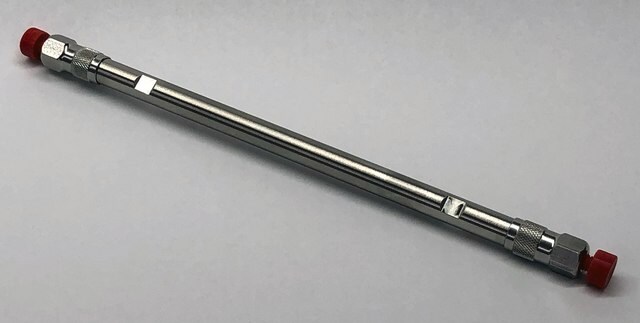59356-U
Discovery® Cyano (5 µm) HPLC Columns
L × I.D. 15 cm × 4.6 mm, HPLC Column
Synonym(s):
Cyano Bonded Phase Column
About This Item
Recommended Products
product name
Discovery® Cyano HPLC Column, 5 μm particle size, L × I.D. 15 cm × 4.6 mm
material
stainless steel column
Agency
suitable for USP L10
product line
Discovery®
feature
endcapped
manufacturer/tradename
Discovery®
packaging
1 ea of
extent of labeling
4.5% Carbon loading
parameter
≤70 °C temp. range
400 bar pressure (5801 psi)
technique(s)
HPLC: suitable
LC/MS: suitable
L × I.D.
15 cm × 4.6 mm
surface area
200 m2/g
surface coverage
3.5 μmol/m2
impurities
<10 ppm metals
matrix
silica gel, high purity, spherical base material
fully porous particle
matrix active group
cyano phase
particle size
5 μm
pore size
180 Å
operating pH range
2-8
application(s)
food and beverages
separation technique
hydrophilic interaction (HILIC)
normal phase
reversed phase
Looking for similar products? Visit Product Comparison Guide
General description
Features and Benefits
- Low hydrophobicity for rapid elution of hydrophobic analytes
- Excellent peak shape and retention of strongly basic analytes
- Retention of polar analytes
- Unique selectivity
- Significantly less retention than C18 (typically requires lower % organic mobile phase)
- Stable, low-bleed LC-MS separations
- Compatible with highly aqueous organic phases
Legal Information
Storage Class Code
13 - Non Combustible Solids
WGK
WGK 3
Flash Point(F)
Not applicable
Flash Point(C)
Not applicable
Choose from one of the most recent versions:
Already Own This Product?
Find documentation for the products that you have recently purchased in the Document Library.
Our team of scientists has experience in all areas of research including Life Science, Material Science, Chemical Synthesis, Chromatography, Analytical and many others.
Contact Technical Service

